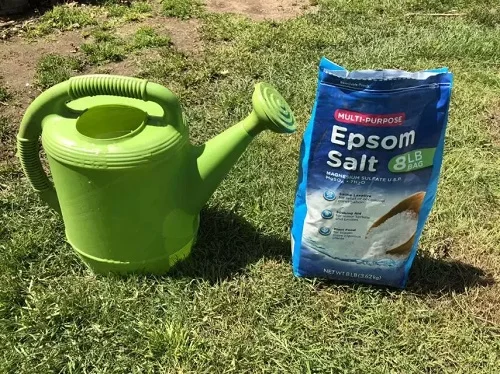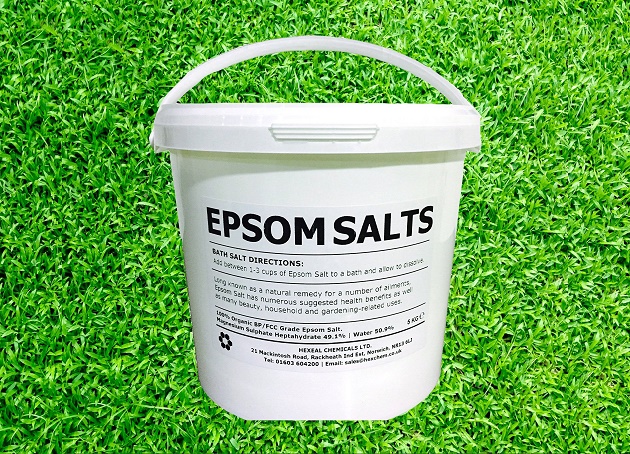Revealing the Magic of Epsom Salt: What Does Epsom Salt Do For Lawns?
When it comes to nurturing the perfect lawn, gardeners are always on the lookout for that secret ingredient that can transform their outdoor oasis into a vibrant, lush paradise. Enter Epsom salt, a household staple with a hidden talent for enhancing the health and vitality of your lawn. But what exactly does Epsom salt do for lawns, and how can you harness its potential to create a greener, healthier, and more resilient landscape?
In this informative journey, we’ll delve into the captivating world of Epsom salt and uncover the science behind its impact on your lawn. We’ll explore the magical properties of this natural mineral compound, known as magnesium sulfate, and how it can become your lawn’s best friend.
So, if you’ve ever wondered about the magnificent effects of Epsom salt on your grass, you’re in the right place. Join us as we demystify its benefits, explain the proper application, and unlock the secrets to a lawn that’s the envy of the neighborhood. Let’s embark on this green adventure and discover the wonders of Epsom salt for lawns.
1. Understanding Epsom Salt
Epsom Salt Composition:
Epsom salt is not a true salt but a mineral compound composed of magnesium and sulfate. It’s known chemically as magnesium sulfate.
Magnesium Benefits: Magnesium is an essential nutrient for plants, playing a vital role in photosynthesis, chlorophyll production, and overall plant health.
2. Magnesium Boost for Your Lawn
Preventing Magnesium Deficiency:
Epsom salt can help rectify magnesium deficiencies in your lawn.
Yellowing Leaves: If your grass shows signs of yellowing between the leaf veins, it may be magnesium deficient. Epsom salt can provide the necessary magnesium boost.
Lush Green Color: Magnesium contributes to the green color of your lawn, and Epsom salt can enhance this vibrancy.
3. Improving Nutrient Uptake
Sulfate Enhancement:
Epsom salt provides sulfate, another critical nutrient for plants.
Enhanced Nutrient Absorption: Sulfate aids in the uptake of essential nutrients like nitrogen, phosphorus, and potassium.
Healthier Roots: Improved nutrient absorption results in healthier and more robust root systems.
4. Stress Alleviation for Your Lawn
Stress Reduction:
Epsom salt can help your lawn recover from stress.
Drought Recovery: After a period of drought or water stress, Epsom salt can assist your grass in bouncing back.
Impact of Fertilizers: If your lawn has been exposed to excessive synthetic fertilizers, Epsom salt can mitigate the negative effects.
Why Are Squirrels Digging Up My Lawn
5. Weed Control and Pest Deterrence
Weed Suppression:
Epsom salt can help keep weeds at bay.
Sprinkle and Deter: Sprinkling Epsom salt around the perimeter of your lawn can deter weed growth.
Slug and Snail Control: Epsom salt can also act as a barrier against slugs and snails, preventing damage to your garden.
6. Epsom Salt Application
Proper Usage:
Applying Epsom salt to your lawn requires a methodical approach.
Even Distribution: Spread Epsom salt evenly across your lawn, ensuring it reaches the root zone.
Dosage: Follow the recommended dosage guidelines to prevent overapplication.

7. Watering and Timing
Watering In:
After applying Epsom salt, ensure it’s watered into the soil.
Watering Timing: Water your lawn immediately after applying Epsom salt to promote absorption into the soil.
8. Avoiding Excessive Use
Balanced Application:
While Epsom salt can be beneficial, avoid excessive use.
Monitoring Lawn Health: Regularly assess your lawn’s health to determine when Epsom salt is needed.
Consulting Experts: Seek professional advice if you’re uncertain about Epsom salt application.
9. Enjoy the Benefits of Epsom Salt
Lush and Healthy Lawn:
With proper Epsom salt application, you can revel in the beauty of a lush and healthy lawn.
Vibrant Greenery: Your grass will display a vibrant green color, a testament to its improved nutrient intake.
Resilience: Your lawn will be more resilient in the face of challenges like drought and pests.
Frequently Asked Questions (FAQs)
Q1: Is Epsom salt safe for all types of grass?
A: Epsom salt is generally safe for most types of grass, including common lawn varieties like Kentucky bluegrass, Bermuda grass, and fescue. However, it’s recommended to perform a soil test before applying Epsom salt to determine if your lawn lacks magnesium. If your soil already has sufficient magnesium, additional Epsom salt may not be necessary.
Q2: How often should I apply Epsom salt to my lawn?
A: The frequency of Epsom salt applications depends on your lawn’s specific needs. A common recommendation is to apply Epsom salt once or twice a year. It’s best to observe your lawn’s health and conduct a soil test to determine the necessity of additional applications.
Q3: Can I use Epsom salt to combat specific lawn issues like yellowing or drought stress?
A: Yes, Epsom salt can be used to address specific lawn issues. For instance, if you notice yellowing between the leaf veins or your lawn has experienced drought stress, Epsom salt can help rectify magnesium deficiencies and promote recovery. However, it’s essential to use it judiciously and as part of a comprehensive lawn care regimen.
Q4: Can Epsom salt be used as a weed control method on my lawn?
A: Epsom salt can serve as a natural weed deterrent when sprinkled around the perimeter of your lawn. It’s particularly effective against certain weeds, like dandelions. However, it’s not a foolproof method and other weed control measures may be necessary for comprehensive weed management.
Q5: Is Epsom salt safe for the environment and my pets?
A: Epsom salt is generally considered safe for the environment and pets when used in moderation. However, it’s advisable to keep pets and children away from areas where you’ve recently applied Epsom salt until it’s been watered in to prevent ingestion. Additionally, avoid overuse, as excessive Epsom salt application can affect soil pH and nutrient balance.
Q6: Can Epsom salt replace traditional fertilizers in my lawn care routine?
A: While Epsom salt provides magnesium and sulfate, it should not be considered a replacement for a comprehensive lawn fertilizer. Traditional fertilizers contain a balanced mix of essential nutrients, whereas Epsom salt primarily addresses magnesium deficiencies. It’s best to incorporate both Epsom salt and a balanced lawn fertilizer into your routine for optimal results.
Q7: Can Epsom salt be used for other plants in my garden, or is it primarily for lawns?
A: Epsom salt can benefit various plants beyond lawns. It’s commonly used for vegetables, flowers, and shrubs to address magnesium deficiencies and enhance overall plant health. Ensure you adjust the Epsom salt application according to the specific needs of the plants in your garden.
Q8: Can Epsom salt cause harm to my lawn or plants if overused?
A: Excessive use of Epsom salt can potentially disrupt the balance of nutrients and alter soil pH, which may harm your lawn or plants. It’s crucial to follow recommended dosage guidelines and avoid frequent or excessive application. Always assess your lawn’s health and nutrient requirements before using Epsom salt.
Q9: Can I apply Epsom salt at any time of the year?
A: Epsom salt can generally be applied to your lawn at any time of the year. However, many gardeners choose to apply it during the growing season in the spring or early summer. This timing aligns with the period when grass is actively taking up nutrients and growing vigorously.
Q10: Are there any signs that indicate my lawn needs Epsom salt?
A: Yellowing leaves, especially when the yellowing occurs between the veins, can be a sign of magnesium deficiency in your lawn. Additionally, if you notice slow or stunted growth, a lack of vibrancy, or recovery from stress (like drought) is delayed, it might be beneficial to consider Epsom salt application. Conducting a soil test can provide more accurate insights into your lawn’s specific nutrient needs.
Q11: Can Epsom salt be used in combination with other lawn care products like fertilizers and herbicides?
A: Epsom salt is compatible with many lawn care products. It’s often used in conjunction with fertilizers to enhance nutrient absorption. However, it’s essential to follow specific product guidelines and consider the interactions between various lawn care treatments. Avoid mixing incompatible products.
Q12: Is there a risk of Epsom salt negatively affecting the water supply or groundwater if it’s used on lawns and gardens?
A: When used as directed and in moderation, Epsom salt is unlikely to pose significant risks to the water supply or groundwater. It’s essential to avoid excessive application and ensure that the Epsom salt is watered into the soil promptly to prevent runoff into water sources.
Conclusion
Epsom salt, with its magnesium and sulfate components, holds remarkable potential for enhancing the health and vibrancy of your lawn. By understanding its benefits, applying it judiciously, and ensuring proper watering, you can enjoy a lawn that stands out with its lush green color, resilience, and overall vitality. Say goodbye to yellowing leaves and welcome the rejuvenating effects of Epsom salt for your outdoor oasis.

